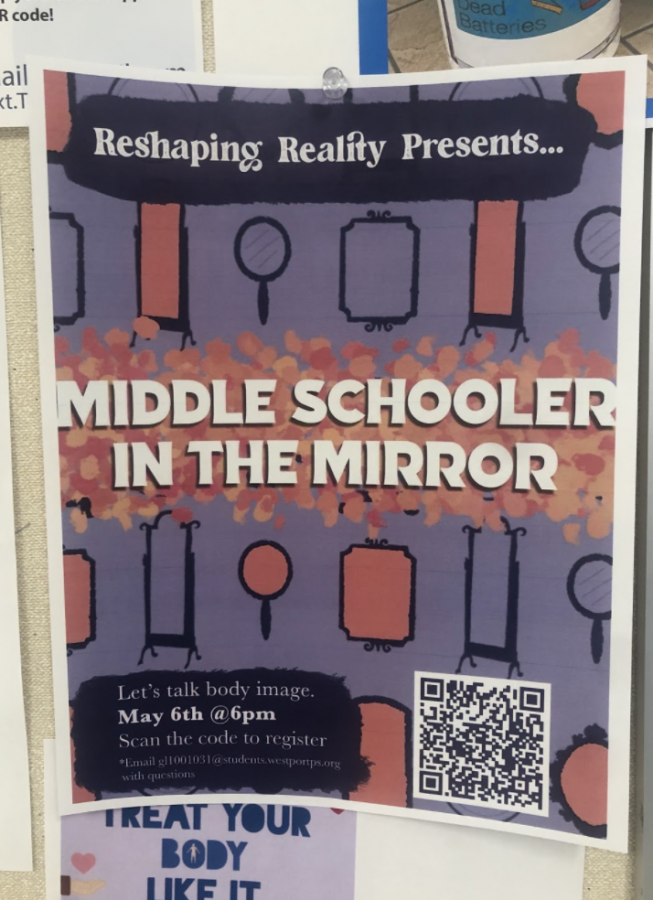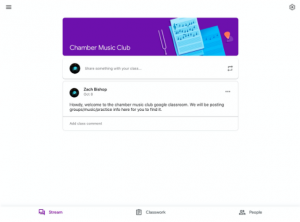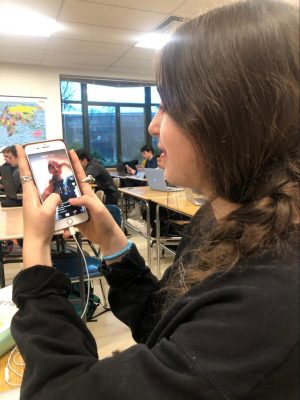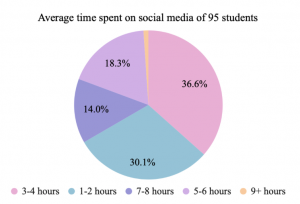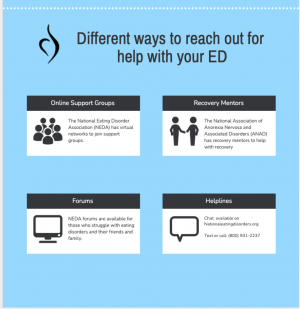Reshaping Reality hopes to spread advice through virtual ‘Middle Schooler in the Mirror’ event
Photo by Finnegan Courtney ’23
Reshaping Reality has put up several posters around the school, including a QR code to the Zoom (which can be scanned here), which takes place on May 6 at 6 p.m.
Reshaping Reality will soon throw their ‘Middle Schooler in the Mirror’ event for middle and high school families. However, due to the COVID-19 pandemic and multiple rules and regulations being in place, the event will be held over Zoom on May 6, rather than the traditional in-person gathering.
“We talk about the challenges that kids start to face in middle school in regards to body image, eating disorders, dieting, social media, cliques, and other issues,” Reshaping Reality Co-President Kylie Race ’21 said. “We share our perspective as [students] who have gone through the same experiences, and use facts and statistics to get our point across.”
It is often a struggle for parents and teachers to connect with what their children and students are going through.
“By sharing more recent experiences with parents, [who are] about to endure the same from the eyes of their child, it is helpful to all members of the family,” Kaila Kennedy ’23 said. “A young adult will be able to communicate and express the emotions that come with being an adolescent, especially to a parent that wants to help and understand their child in the best way possible.”
Currently, body image is a serious issue worldwide, as according to the Cleveland Clinic, body dysmorphia affects near one in every 50 people. In the U.S. alone, an estimate says anywhere between five and ten million people are affected by this disorder along with a study by Medpage Today associating it with “an increased risk for suicidal behavior.”
This club is designed to help students struggling with body image among other areas. In addition to helping students, the club educates the parents with the information necessary to help their own children in other aspects of life.
“Children become more aware of their bodies and start to compare themself to their peers,” Reshaping Reality Co-President Sonia Trinkle ’21 said. “It is important for the children to be aware of these issues so they know how to handle their emotions and it is important for the parents to be aware of these issues so they know how to help their children.”
High school students agree that self-image is far more talked about in high school and that middle school lacks conversations about this topic.
“I think in middle school it isn’t talked about as much […] because to some people, it could be more sensitive to [students],” Riley Twiss ’23 said. “But in high school, it’s talked about [more] especially in health [classes] because of all the talks about wellness and self-confidence.”
However, others feel that middle schoolers’ body sensitivity along with lack of overall awareness of it at that age, could be a factor in why it is not talked about enough.
“I think that many teens are too sensitive and obsessed with how others perceive them and this causes […] stress and unnecessary beauty standards,” Matthew Fleming ’23 said. “Awareness is [why] it isn’t talked about enough [along with] sensitivity about the topic.”
All members foresee a productive and effective discussion about this important issue that welcomes people of all ages to attend, especially those in middle and high school.
“Throughout the year, we [do] other activities during National Eating Disorder Awareness week and fundraising events for the NEDA organization,” Trinkle said. “It will be an interesting [and lively] discussion topic [and] we would love to have people join.”
This event and club could be a revolutionary starting point for students dealing with body image issuesBeing educated on body positivity will benefit how they control their emotions, especially in this arena from someone who knows what they are going through, which Kennedy agrees with.
“I know from my own experience that hearing a teacher speak about emotional intelligence at a later stage in my education is nugatory as my mentality has been molded already, unlike that of an [elementary and middle] schooler. So by discussing the topic at a young age, as despondent as it is, will help the child’s mental health through an early understanding,” Kennedy said. “Even if they don’t quite get it, instilling self-love is important and can be built on after the initial discourse, unlike conversing with [someone] who has already been exposed to the hardships of self-esteem.”












































